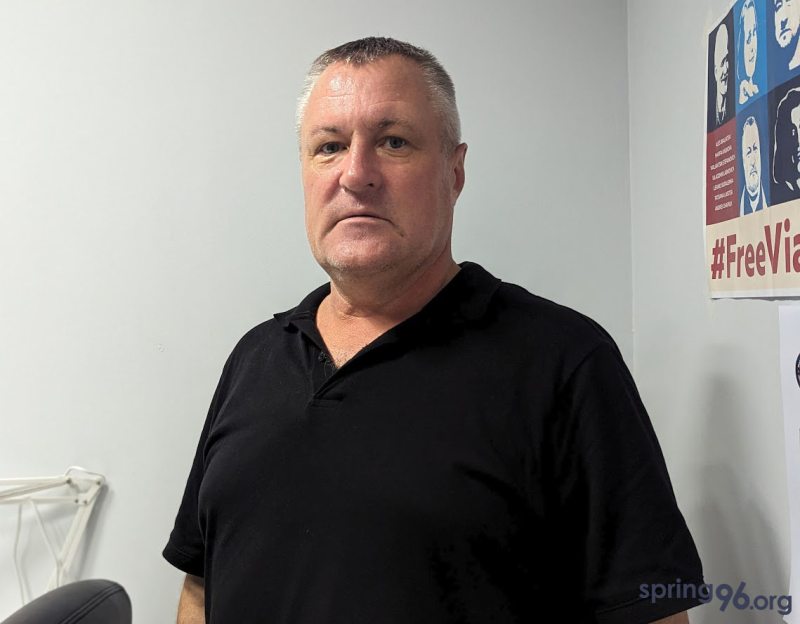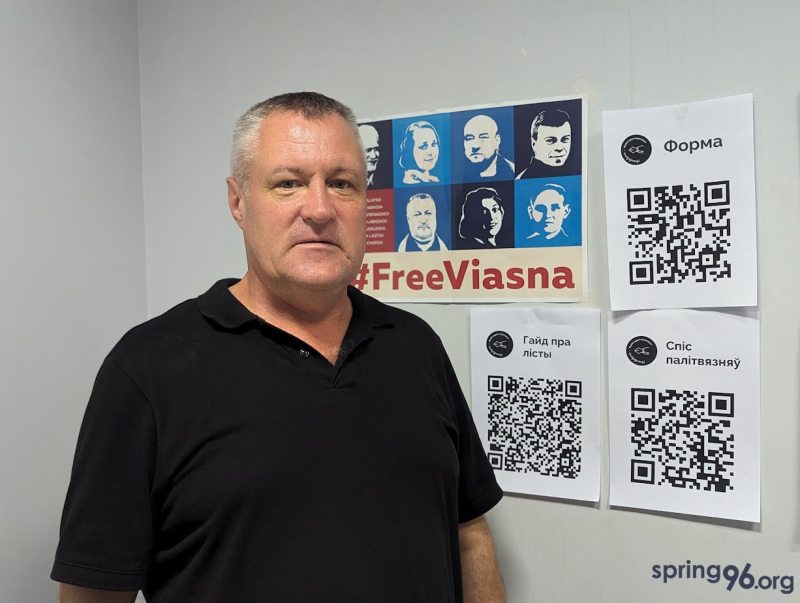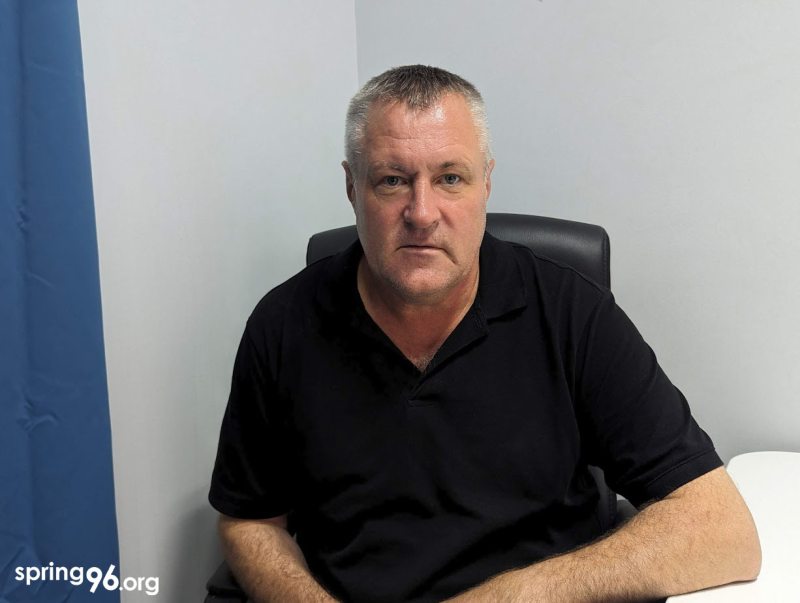Rights advocate Leanid Sudalenka on his jail experience: “I was labeled a persistent violator”
In his latest talk with Viasna, Leanid Sudalenka, our fellow human rights defender and former political prisoner, tells why he decided to leave Belarus, how political prisoners are discriminated against, and why solidarity is essential.
On leaving Belarus
After being released, as the rules required, I had to register with the police within three days. When I arrived, I was fingerprinted and underwent other procedures. Since my criminal offense was not considered severe, my conviction would be expunged within two years. During that time, I had to visit the local District Police Department every week for preventative talks. Though my crime was not severe, it fell under an extremist charge, and my name was listed in the government-approved extremist database. The authorities did not leave me alone, and I faced various restrictions and discrimination.
They came to my house, recorded me, and ensured I was present. They told me they could visit even at night. If I left the city for over three days, I had to ask for permission, or it would be considered a violation. I was trapped and realized that even as a lawyer, I would be unable to defend myself.
I checked my police record and found that I had no debts to the state and was allowed to leave the country. Later, I learned that an unofficial list at the border included "extremists," and I would not have been allowed to leave through official channels. I am thankful to the BYSOL foundation for their help in enabling my departure.
Deciding to leave was difficult for me, especially because I had the opportunity to leave two weeks before my arrest and chose to stay. At that time, I hadn't yet experienced the full power of the government's repression. What happened to the leadership of Viasna and other human rights defenders was terrifying. When I learned about it in the colony, I was horrified. The country's human rights situation was a catastrophe, even worse than Stalin's repressions in 1937.
I have a family, and it was a hard decision to make because they were not morally prepared to leave. My wife said she'd rather visit me in Vilnius (where I relocated) than in the prison. I would have been jailed in a maximum-security colony if I were tried again. I realized that my situation would only worsen if I stayed.
Seeing the intense focus on me by the police, I decided to leave. I keep telling myself that I'm on assignment and ready to do whatever it takes to ensure our “foreign assignment” ends as soon as possible. I do not plan to spend the rest of my life in emigration. I want to return to my homeland; everything I have is there.
On fighting for your rights in a Belarusian jail
If you ask whether it's possible to stand up for one's rights in that place, I would say definitively no. A person has to choose between preserving their health or defending their rights. The system breaks people down, even very strong people. The way it's set up is that when you arrive at the camp, you must sign a paper to follow the rules of internal order, including obeying any requirement by the staff, inspectors, or police. If you refuse to sign, you'll be sent to solitary confinement and you'll stay there.
The government has divided all the prisoners into two categories: political, who wear yellow badges and are charged with "extremist" crimes, and everyone else: charged with violence, murder, drug addiction, hooliganism, theft, fraud. Besides more frequent inspections, we are even limited in our daily lives. A blatant example: all political prisoners hold violator status. I was labeled a persistent violator. 'Persistent' means having three or more violations in a year (only after a year are they wiped clean). Violations can be an unbuttoned button, or failing to respond formally: "Convict Sudalenka Leanid, born 1966, sentenced to three years under Article 342. Beginning of term: fourteenth zero first twenty-second, end of term twenty-first zero seventh..." I had to repeat this a hundred times a day. If you miss once, it's a violation.

On mail restrictions and propaganda media
Being 'political' made life harder. I remember joining a chess club and taking second place, but receiving no acknowledgment, not even a commendation. An ordinary prisoner might have received benefits like extra visits. I served a year and a half without a single visit from my family or a letter from anyone other than my wife.
When I was in the detention center, I received numerous letters daily. Why did I receive more than a thousand letters a year there, but not a single one in the colony? I realized people were writing, but their mails weren't given to me. The lack of connection to my family and the unequal treatment reminded me daily of my status as a political prisoner, reinforcing the system's power to break the will of those it incarcerates.
During my time in detention, I faced an information blockade. I was allowed to watch only specific pro-government channels approved by the administration and subscribe to a limited range of newspapers. Phone calls were allowed, but monitored and cut off if I discussed forbidden topics. The operator would warn you before letting you call: “Not a word about Ukraine, not a word about Wagner group...”
On detention conditions
The conditions worsened ten days before my release when I was thrown into solitary confinement without warm clothing, bedding, or a proper bed. I endured constant cold and discomfort, forced to sleep on the floor with only toilet paper and my fist for a pillow.
In protest, I went on a hunger strike. I refused food but continued to drink tea. My demands were ignored, and the administration justified the inhumane treatment, claiming it was "prescribed by law." I challenged them, but to no avail. The deputy head of the colony did meet with me, but nothing changed.
I left that place having slept on the floor for ten days. It was a cruel and demeaning experience, challenging my physical endurance and fundamental human rights. This was a stark contrast to my earlier time in detention, where I'd been allowed to follow the news, and it left me wondering why basic human decency was denied in solitary confinement.
On jail medicine
I protested the fact that I was thrown into solitary confinement without a medical examination, despite my known ailments, including diabetes. The medical care there was atrocious, something that I think should not exist in the 21st century. I didn't even receive the daily medications I needed, like my diabetes pills. When I spoke to the doctors about it, they shrugged and left.
I also experienced discrimination. When amnesty was announced, and it was thought that it might apply to political prisoners, they quickly branded me a rule violator. They even caught me on video at my workplace, accusing me of not presenting myself. This was deliberate, as the amnesty didn't apply to those who repeatedly violated the regime. It was impossible not to be labeled a violator, which was done artificially.
They denied me long-term visits from my family, even short visits. Other prisoners were allowed one to three-day visits; I never had one. I was even denied a meeting with my wife when she brought me a 50-kilogram food package. On New Year's Eve, there was an Open Doors Day for family members to visit. Not a single political prisoner was on the list of lucky ones to receive a visit. My underage son and wife could not come to embrace me before the New Year. This is a bright example of discrimination for political reasons.
When I had a fever, I went to the medical unit, and the doctor just gave me a pill and told me to go to work, saying it would pass by evening. This was from a doctor who once took the Hippocratic Oath. They wouldn't even let me stay in the barracks and treat myself, forcing me to work in a cold workshop. This negative treatment was reserved mainly for political prisoners like me, called “yellow badge wearers.”
On forced labor
Living conditions were more or less normal, but work was tough. We alternated between the first and second shifts every week. Initially, I worked in woodworking as a laborer, doing light work due to my health restrictions. It wasn't hard. But when I was transferred to wirework in the metal shop, things got harsh. We were given pliers, a hammer, and a knife – no work gloves were provided, so my hands were often cut and dirty. The work was manual, stripping insulation to extract lead, aluminum, or copper, depending on the wires. There was a specific quota to meet, but failure to meet it didn't usually result in punishment. Refusing to work, however, would lead to serious consequences. And we worked without pay, earning only a ruble or two per month. There was an account for family deposits, but my access was limited due to being labeled a chronic violator. Making choices between essential purchases was hard. It was a restrictive and challenging experience.
On solidarity with political prisoners and #FreeViasna campaign

When I was in the pre-trial detention center, I learned about the solidarity campaign from the letters that were sent to me. As for the colony, it was more challenging to get information there, because you could only hear something on personal calls. Or people passed it on to each other: someone had a visit, talked to their relatives, and they, for example, told them about the campaign, and they passed it on to me.
Like when I found out about Ales Bialiatski winning the Nobel Prize—I heard it from a fellow political prisoner who shouted the news across the dining hall. Later, I confirmed it with my family. I thought this award might help Ales since judging a human rights defender is one thing, but judging a Nobel laureate is another. Sadly, Belarus's judicial system showed its true face.
Rumors flew among the prisoners, but they always had to be verified. Misinformation could be shared, like hearing about Tsikhanouski's death, only to find out it was not true.
I want to emphasize the importance of supporting the solidarity campaign. Even though I'm safe now, almost 1500 people are recognized as political prisoners.
I still wonder how we can leverage any influence to move the release of political prisoners forward, especially since Lukashenka has placed all his eggs in the Russian, Kremlin basket. There's no negotiation with his administration, and I'm personally trying to find answers. I've been approached to ask for a pardon, but I've never admitted guilt and never will. I've been doing the same human rights work for 20 years. I don't see helping people, even financially, as a criminal act, and I won't agree to plead guilty.
Today, the repression wave is terrifying. People are being imprisoned for social media reactions, sharing, taking pictures of the wrong things, or donating as little as $15. The sentences are getting more severe, up to 5-7 years. Is this the worst we will see in Belarus, or are even harsher repressions to come? They are attempting to restrict not only our speech but even our thoughts.
Currently, my plan involves meeting and talking with people to understand what needs to be done to release all political prisoners. I'm willing to put myself on the line for this cause since I see no other path but human rights advocacy. But I need time to recover, create a minimal sense of daily life, and feel safe again. Even when I hear footsteps in the corridor, it's still so.... complicated.
I thank everyone who helped me.


















